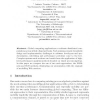Free Online Productivity Tools
i2Speak
i2Symbol
i2OCR
iTex2Img
iWeb2Print
iWeb2Shot
i2Type
iPdf2Split
iPdf2Merge
i2Bopomofo
i2Arabic
i2Style
i2Image
i2PDF
iLatex2Rtf
Sci2ools
106
click to vote
GLOBAL
2003
Springer
2003
Springer
Performance Evaluation for Global Computation
Abstract. Global computing applications co-ordinate distributed computations across widely-dispersed hosts. Such systems present formidable design and implementation challenges to software developers and synchronisation, scheduling and performance problems come to the fore. Complex systems such as these can benefit from the application of highlevel performance analysis methods founded on timed process algebras. In this paper we compare the use of two such approaches, the PEPA nets and EOS methods, illustrating our presentation with the example of modelling Web services.
Artificial Intelligence | Co-ordinate Distributed Computations | GLOBAL 2003 | Performance Analysis Methods | Timed Process Algebras |
Related Content
| Added | 06 Jul 2010 |
| Updated | 06 Jul 2010 |
| Type | Conference |
| Year | 2003 |
| Where | GLOBAL |
| Authors | Linda Brodo, Pierpaolo Degano, Stephen Gilmore, Jane Hillston, Corrado Priami |
Comments (0)

